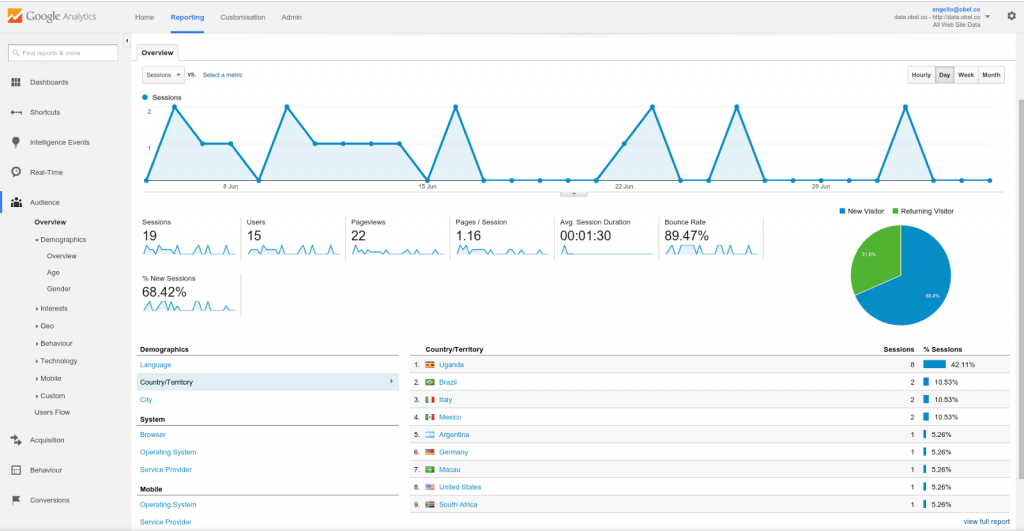Uganda’s telecommunications companies seem to be on a hunt for new revenue streams. Competition has driven down the margins from traditional voice, data and text services; As a result telecom companies have been pushing value added services that ran on top of the traditional services they provide. The biggest of these of course is Mobile Money. There’s also the various subscription services that are responsible for most of the spam SMS we receive daily.
All these value added services however have the drawback that they require active participation of the telecom subscribers. With analytics it is possible for telecom companies to earn revenue from the passive activities of the subscribers on their networks.
Analytics is the computational analysis of data and statistics. It is an essential tool for many businesses. Most businesses have to deal with two problems in analytics; getting the data and analyzing the data. Telecom companies in their day to day business already generate a lot of data which from an analytics perspective is currently going to waste.
The Data
Telecom companies have access to at least 4 basic categories of data; location, income, social networks and demographics
- Location data: Can be sourced by the GPS in a smart phone or if thats unavailable as in feature phones, can be sourced by cell tower triangulation.
- Income data: Since the vast majority of Ugandans are on prepaid plans, significant relative income information can be gleaned from expenditure on airtime.
- Demographics: Since 2012 Ugandans have been required to register their mobile phone SIM cards with the telecom companies. This means telecom companies have a wealth of demographic data about their subscribers
- Social Networks: Based on who you communicate with, telecom companies know the network of people you are connected to.
Performing analytics on these four datasets creates many potential applications in a wide array of industries.
Example Applications
Business Analytics & business Intelligence: Say you are invested in a large walk-in type business; Telecom companies could in theory provide you with information about who visits your business, their age, sex, where they come from. All this information is potentially valuable to businesses. Retail outlets like Uchumi and Nakumatt for example try to get such information today by encouraging customers to sign up for loyalty cards. But the vast majority of their customers don’t ever sign up for the cards. What they all sign up for however is a mobile phone service.
Road Traffic analytics: Using subscriber location data, telecom companies can generate a significant amount of traffic data. Based on how fast you are handing off to different cell towers, they can gauge your speed, and with that they can gauge how you are traveling; whether you are walking, running, on a bike or car it is even possible to differentiate between a matatu and private vehicle.
This data for a single subscriber may not be very useful, collectively however, subscriber data can be used to make predictions about mass behavior (traffic congestion and patterns for instance) and thus be useful to city planners, commuters and businesses.
Investment analysis: Say you are an investor looking for the best place to invest. Telecom companies could in theory provide you with a wealth of decision support data. For example, using mobile phone expenditures, they could discern the wealthiest neighborhoods. They could tell if a particular location has a lot of people commuting to it regularly; To an investor this could be an indication that there is a market for residential properties in the area. Conversely if a location has a lot of people moving far from it regularly it could be an indicator that there is a market for certain services that could be brought nearer. All this is information that telecom companies could provide.
Privacy
With anything that involves the use of user data of course there is plenty of opportunity for abuse and perhaps more so in a country like Uganda with not much privacy protection to begin with. Ideally, the implementation of such a system would come with a strong regulatory framework in place. Though this seems highly unlikely for Uganda.
More and more the future looks to be a place where more and more decisions are made by algorithms and with microsecond precision. All this is always supported by data collection and analysis mechanisms. If you are a business or state in a competitive field, analytics will likely soon become a necessity if you wish to get ahead and stay ahead or even just keep up. And telecom companies more than just about anyone, are sitting on the biggest goldmine of data this side of google. Ask the NSA!
Discover more from Dignited
Subscribe to get the latest posts sent to your email.












